Before embarking on my SAS journey I had no idea just how intense college courses would be. I am so grateful that I decided to do this program before entering my first year of college. It really provided me with an idea of what to expect in the fall.
Explore, Learn, and Grow
Join Semester at Sea as we sail to countries in Europe, Africa, and Asia. You’ll experience a wide range of cultures and histories, setting sail from Amsterdam, Netherlands and disembarking in Dubai, UAE — with a whole lot in between — all while living and learning aboard a ship you’ll call home, with a community that’s designed to build friendships for life.
Make the Voyage Your Own
With guided Field Programs and plenty of opportunities for in-country travel on your own or with fellow SAS voyagers, you’ll explore your interests and deepen your understanding of the world. Bring a sense of adventure and a willingness to discover the unknown.
- Amsterdam, Netherlands
- Lisbon, Portugal
- Casablanca, Morocco
- Barcelona, Spain
- Dubrovnik, Croatia
- Piraeus, Greece
- Limassol, Cyprus
- Suez Canal Transit, Egypt
- Aqaba, Jordan
- Mombasa, Kenya
- Mumbai, India
- Dubai, United Arab Emirates
-
1
Amsterdam, Netherlands
Sep 09With a rich artistic heritage, progressive attitudes, and picturesque countrysides, the Netherlands is a must-see destination in Europe. Amsterdam offers unconventional restaurants, a bike culture, charming canals, and world-class museums that make this city a vibrant and exciting place to explore. Highlights include visiting the Anne Frank House in Amsterdam, along with many other museums. You can bike along the canals or explore the waterways via boat. Or if it is tulip season, visit Keukenhof, which claims to be the world’s largest flower park and boasts an endless land of multicolored tulips.
- capitol Amsterdam
- language Dutch
- religions Roman Catholicism, Protestantism
- government Unitary state, constitutional monarchy, monarchy, hereditary monarchy, parliamentary system, federacy, representative democracy
- currency Euro
- population 17.44 million (2020)
-
2
Lisbon, Portugal
Sep 16 – Sep 20Emerging as one of Europe’s unsung destinations, Portugal is an energetic and vibrant country with a centuries-long history. Semester at Sea ports of call in Portugal include Lisbon and Oporto. Field Program options include exploring the city by Tuk Tuk along with taking in Lisbon’s street art. Highlights include taking a Portuguese cooking class or embarking on an overnight trip to southern Portugal where you can kayak along natural waterways.
- capitol Lisbon
- language Portuguese
- religions Roman Catholicism
- government Republic, unitary state, parliamentary system, democratic republic
- currency Euro
- population 10.31 million (2020)
-
3
Casablanca, Morocco
Sep 23 – Sep 28The Kingdom of Morocco is an immensely rich cultural center point of north-western Africa. The port of Casablanca, established in the 20th century, is a busy metropolis and home to the Hassan II Mosque, the second largest in the world after Mecca. This enormous structure, resting at the edge of the Atlantic Ocean, was built by 30,000 workers over a period of five years, officially opening in 1993. Semester at Sea ports of call in Morocco include Casablanca and Tangier. Field Program options include multi-day trips to the Sahara Desert, where students can ride camels to their campsite and sleep under the stars. Highlights include visiting Chefchaouen, otherwise known as the blue city, eating popular Moroccan dishes such as couscous and tagine, and drinking mint tea.
- capitol Rabat
- language Arabic, Tamazight, Tachelhit, Tarifit, French
- religions Islam
- government Monarchy, unitary state, parliamentary system, constitutional monarchy
- currency Moroccan dirham
- population 36.91 million (2020)
-
4
Barcelona, Spain
Oct 04 – Oct 09Spain’s diverse landscape, architecture, art, and cuisine make the country rich in culture and charm. Semester at Sea ports of call in Spain include Barcelona, Valencia, and La Coruna. Field Program options include explorations of the art, culture, and architecture of the two diverse regions. Highlights include overnight trips to Sevilla, Granada, and Madrid, with opportunities to explore the cathedrals, gardens, palaces, and other cultural sites that reflect Spain’s Moorish and Islamic heritage.
- capitol Madrid
- language Castillian Spanish, Catalan, Galician, Basque, Aranese
- religions Catholicism
- government Monarchy, unitary state, parliamentary system, constitutional monarchy
- currency Euro
- population 47.35 million (2020)
-
5
Dubrovnik, Croatia
Oct 16 – Oct 20Along the Adriatic Sea runs miles of Croatia’s strikingly beautiful landscape. This, along with 1,200 islands and 2,500 hours of sun a year, makes Croatia a perfect destination for exploring stunning nature. Many medieval towns are also to be found in abundance, making this nation a hallmark of the Mediterranean. Dubrovnik itself is an enchanting pedestrian city known for its intact city walls and towers, historic churches, and museums. Semester at Sea ports of call in Croatia include Dubrovnik. Field Program options include exploring ancient cities and joining a countryside cooking class. Highlights include swimming in clear waters and observing the abundant marine life, which makes snorkeling a popular activity.
- capitol Zagreb
- language Croatian
- religions Roman Catholicism, Orthodox Christianity
- government Parliamentary republic
- currency Kuna
- population 4.047 million (2020)
-
6
Piraeus, Greece
Oct 25 – Oct 29With more ancient sites than any other country in Europe, Greece is an archaeological treasure. Philosophers and theologians have long been drawn here to explore the roots of modern thought. Even so, it is the vibrant blues and rugged beauty of the Greek Islands that beckon many visitors away from the crowds of Athens and the Acropolis. Santorini’s picturesque town of Oia is a whitewashed, blue-domed beauty. The sea-side cafes, windmills and nightlife of Mykonos are also draw for many of our participants. Sandy beaches can be found on Skiathos.
- capitol Athens
- language Greek
- religions Orthodox Christianity
- government Republic, Parliamentary system, Constitutional republic
- currency Euro
- population 10.72 million (2019)
-
7
Limassol, Cyprus
Nov 04 – Nov 07Known for having the cleanest beaches in Europe with year-round blue skies, Cyprus is an island in the eastern Mediterranean Sea renowned since ancient times for its mineral wealth, superb wines, and produce. Today, Cyprus is a popular tourist destination for visitors to experience the island’s laidback lifestyle and welcoming people. Semester at Sea ports of call in Cyprus include Limassol. Field Program options include creating clay art with a local potter as well as exploring ancient archaeological sites in Kourion. Highlights include exploring the Byzantine cultural heritage in the Troodos Mountain region.
- capitol Nicosia
- language Greek, Turkish
- religions Orthodox Christianity, Roman Catholicism
- government Unitary state, presidential system, constitutional republic
- currency Euro
- population 1.20 million (2021)
-
8
Suez Canal Transit, Egypt
Nov 09The Suez Canal is one of the most important waterways in the world, separating the African continent from Asia. This artificial sea-level waterway provides the shortest maritime route between the east and the west due to its unique geographical location. This transit canal runs north-south across the Isthmus of Suez in Egypt and connects the Mediterranean and the Red seas, extending 193 km (120 miles) between Port Said (Būr Saʿīd) in the north and Suez in the south.
- capitol
- language
- religions
- government
- currency
- population
-
9
Aqaba, Jordan
Nov 12 – Nov 16Jordan, centered in the heart of the Middle East, is a peaceful and stable country that warmly welcomes visitors. With countless treasures — from Petra to the Dead Sea to ancient Roman ruins — there are many places to explore. Jordan is a young state that occupies an ancient land, one that bears the traces of many civilizations. Jordan is an integral part of the Arab world and thus shares a cultural tradition common to the region. Semester at Sea ports of call in Jordan include Aqaba. Highlights include visiting one of the New Seven Wonders of the World, the Red Rose City, otherwise known as Petra. This UNESCO World Heritage Site is well known for its rock-cut architecture and water conduit system.
- capitol Amman
- language Arabic
- religions Sunni Islam
- government Parliamentary system, unitary state, constitutional monarchy
- currency Jordanian dinar
- population 10.2 Million (2020)
-
10
Mombasa, Kenya
Nov 27 – Dec 02When it comes to wildlife destinations, Kenya is hard to beat. Between parks, reserves, and private conservations, Kenya is home to some of the most diverse wildlife populations on the planet. Semester at Sea ports of call in Kenya include Mombasa. Highlights include visiting the grassy plains of Amboseli National Park where elephants are silhouetted against Mount Kilimanjaro, among other animals such as giraffes, zebras, hippos, lions, cheetahs, and more. Students also have the chance to see Lake Turkana, a UNESCO world heritage site recognized for holding ancient artifacts from the oldest humans found to date.
- capitol Nairobi
- language Swahili
- religions Protestant Christianity, Catholicism, indigenous religions
- government Republic, unitary state, representative democracy, presidential system
- currency Kenyan shilling
- population 53.77 million (2020)
-
11
Mumbai, India
Dec 11 – Dec 15As one of the most populous nations in the world, India is bustling with a vibrant culture influenced by a variety of religions, including Hinduism, Jainism, Buddhism, and Sikhism. Semester at Sea ports of call in India include Cochin and Mumbai. Field Program options include multi-day trips to Mumbai, the Taj Mahal, New Delhi, and more. Highlights include exploring the Taj Mahal, one of the world’s seven wonders, or traveling to the holy city of Varanasi on the Ganges River. Get a taste of how 70% of Indians live by visiting the rural, traditional Chendamangalam village.
- capitol New Delhi
- language Hindi, English
- religions Hinduism, Buddhism, Jainism, and Sikhism
- government Parliamentary system, federal republic, parliamentary republic, constitutional republic
- currency Indian rupee
- population 1.38 billion (2020)
-
12
Dubai, United Arab Emirates
Dec 22Dubai is the most populous country in the United Arab Emirates, and it is the capital of the Emirate of Dubai. Known for its mixture of cosmopolitan and local culture, Dubai boasts the tallest building in the world, the Burj Khalifa. Located in the eastern region of the Arabian Peninsula, Dubai is a safe and stable country and a popular destination for tourists and business travelers from around the world.
- capitol Dubai
- language Arabic, English
- religions Islam
- government Constitutional monarchy
- currency UAE dirham
- population 9.89 million (2020)
Diversion Ports
As we have been operating shipboard voyages since 1963, we’ve learned that itineraries are subject to adjustment. More than half of our voyages have required some deviation from the planned itinerary. The need to change an itinerary prior to and/or during a voyage can arise due to a number of factors: weather, political unrest, and other health and safety considerations. Should there be a need to adjust our published plans, we have identified potential Diversion Ports in each region of our expected travel. These ports are selected based on a number of factors including safety, educational value, and accessibility. These Diversion Ports simply serve as a backup should anything prevent us from traveling to our planned itinerary.
Other ports may be added as required. Just as our world is dynamic, this list of potential ports is also subject to change. Every destination must pass a comprehensive health and safety assessment, regardless of being a planned or diversion port.
Fall 2022 Diversion Ports
- Bordeaux, France
- Brest, France
- Funchal, Madeira
- Valencia, Spain
- Marseille, France
- Civitavecchia, Italy
- Thessaloniki, Greece
- Safaga, Egypt
- Seychelles
- Muscat, Oman
Voyage Curriculum
The perfect mix of in class and in field education
Semester at Sea’s global comparative study abroad program is enhanced by a robust academic program led by a team of academic experts from renowned institutions around the world. During the 100+ day voyage, students can earn 12-15 credits from Colorado State University, while taking major or elective courses, drawn for 20-25 fields of study. Each class also includes academically required Field Work courses, which are developed by faculty and allow for experiential in-country learning throughout the voyage.

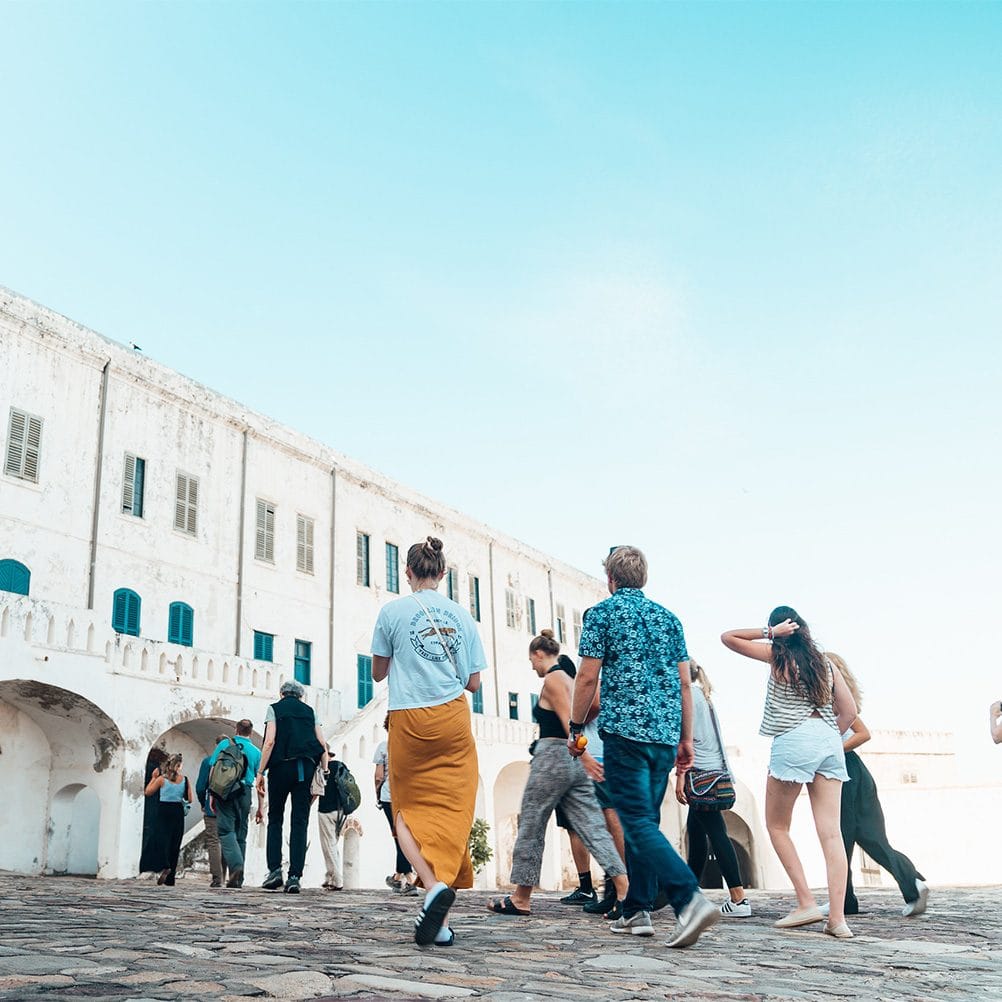
Field Programs
Semester at Sea Field Programs
When Semester at Sea arrives in each country, voyagers will either explore via required Field Work for their classes (for voyagers enrolled in academic courses), participate in optional Semester at Sea-designed Field Programs, or they can plan their own travel experiences.
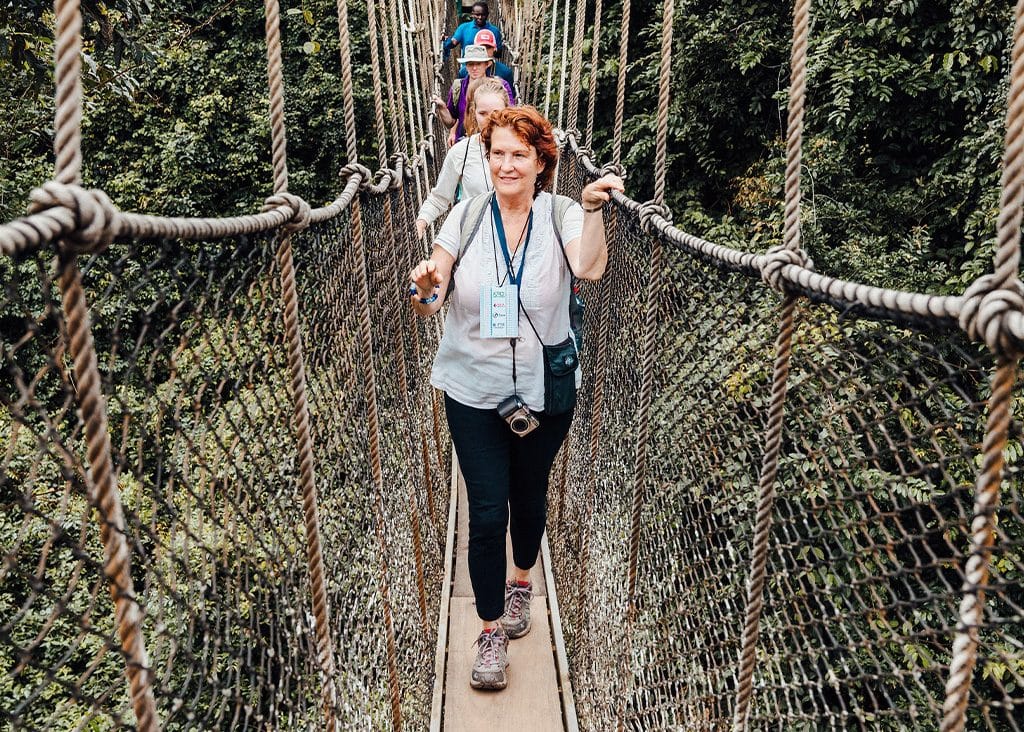
Looking to Sail as a Lifelong Learner?
Semester at Sea’s Lifelong Learning Program provides adult educational travel to people at least 30 years of age seeking an opportunity to travel and learn as part of the Semester at Sea community. There are opportunities to sail on a full or partial (Spotlight) voyage.
Program Fees Overview
A Study Abroad Experience Is a Significant Investment — and Also One of the Best Investments for a Student’s Future.
In addition to earning 12-15 transferable college credits from Colorado State University, student program fees include many amenities and benefits to support students before and during their study abroad experience.
A look into what’s included:
- Semester’s tuition and travel
- Housing, meals, and amenities
- Academic Field Classes
- Email account
- Starter Internet package
- Comprehensive travel health insurance
- Pre-voyage advisement and on-site residential student services staff
- Fuel fee — subject to change depending on global cost fluctuations

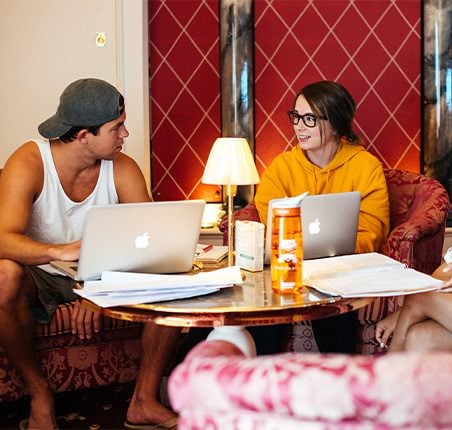
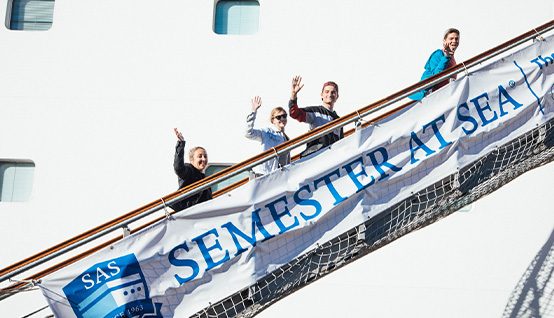
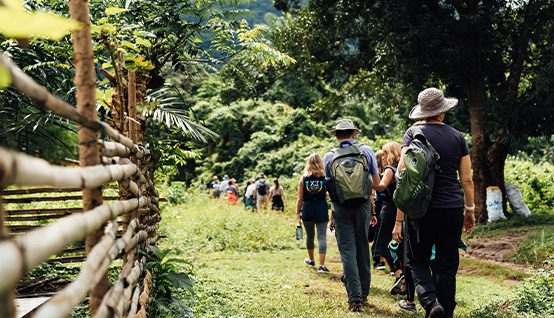


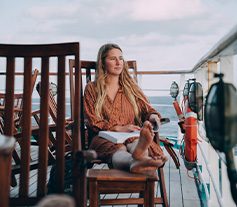
Hear From Past Voyagers
Admissions
Semester at Sea welcomes curious, engaged students of any sex, gender identity, race, disability status, veteran status, nationality, or ethnicity to apply to travel the world as part of our living and learning community.
Frequenty Asked Questions
Everything you need to know about joining a Semester at Sea voyage.
You can begin your journey by selecting a voyage, and then choosing a cabin type. Once you’ve made those two important decisions, fill out the online reservation form. Once it’s submitted, you will receive a follow-up email from the Director of Lifelong Learning with instructions on completing an online background check (required of all adult passengers on our voyages). Once that comes back, you’ll need a $2,500 per person deposit to hold your cabin. Once you’ve paid your deposit, you’re confirmed for the voyage! Full payment is due 90 days prior to the start of the voyage.
Yes, if you do not already hold a passport, you should apply for one now. If you do have a passport, you should check its expiration date. Your passport needs to be valid for six months beyond the end of the voyage. We advise purchasing the largest passport book available. Specific passport requirements are available for confirmed Lifelong Learners via the voyage prep portal.
Visa requirements vary depending on the countries included on the itinerary. Typically, you will need to secure two or three visas individually. Some of the group visas will be obtained by ISE.
Semester at Sea, like any company, sets up a yearly budget based largely on estimates of fixed and variable costs with some room for variation. We are directly impacted from time to time just as everyone is in the travel industry and the maritime industry in particular, with periodic and significant overall increases in our fuel prices. Depending on each port’s regulatory and environmental requirements, we have to consider at least two different types and grades of fuel, each with significantly different price points. Political unrest in certain parts of the world, as well as periodic natural disasters, also can contribute to increasing and unpredictable volatility as well, which in turn lends to overall instability and unpredictability in fuel prices. Fuel charges remain a material component of our overall cost structure. We make every effort to contain fuel costs through enhanced itinerary planning (which we conduct one to two years in advance), and through the use of standard advance fuel purchase commitment arrangements when appropriate. However, it is impossible for us to accurately predict what we might pay for fuel per voyage, port-to-port. Like airlines and major shipping companies, we regrettably must offset these higher costs from time to time with additional fuel surcharges.
In order to facilitate your financial planning, we may invoice you with a “fuel fee,” which at the time is our best indication of what our final “fuel surcharge” is expected to be. In advance of sailing, Semester at Sea may enact a fuel supplement surcharge for all participants, in the event that the average price for the blended types of fuel and related costs during the voyage is expected to exceed a certain budgetary threshold in pricing per metric ton, the amount of which will be offset by advance fuel fee billings/payments. These incurred costs include not only what is expected to be paid in various ports, but also include additional costs for fuel contracts entered into. These fuel contracts are intended to cushion the financial impact if future fuel prices became volatile. Such surcharges when enacted are necessary to offset the total excess fuel costs that exceed this budget threshold. For more information please review our fuel surcharge policy.


